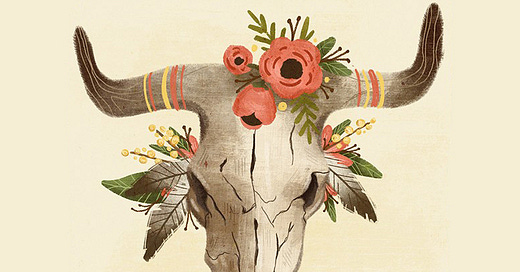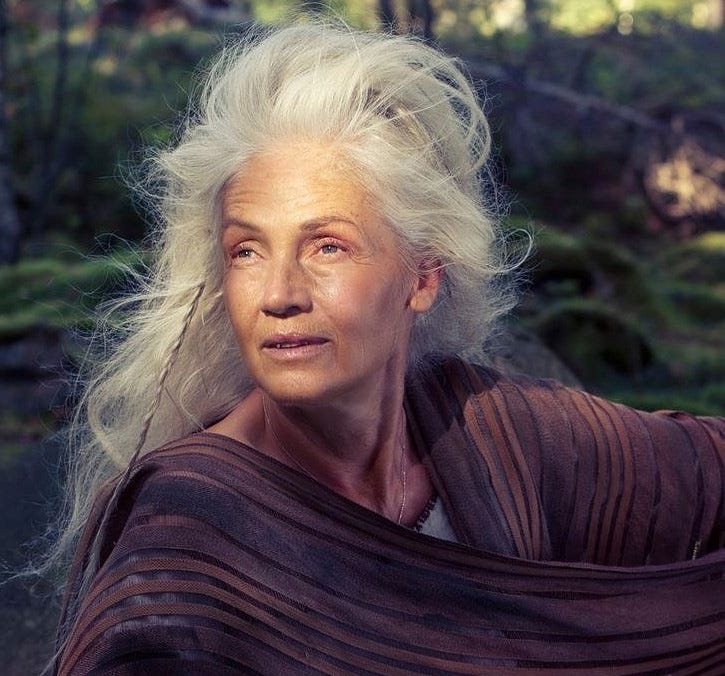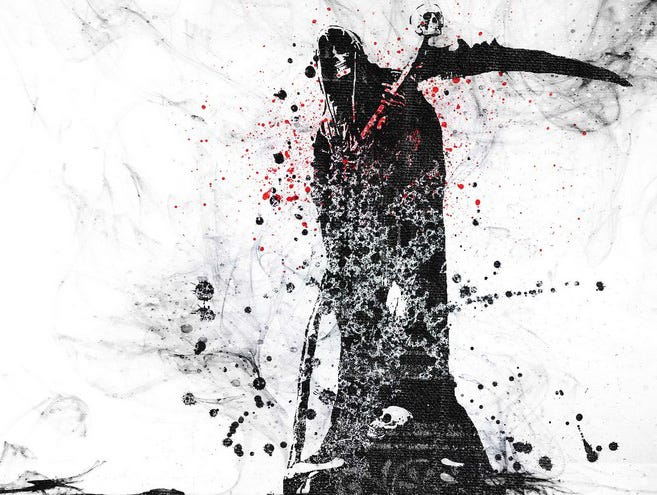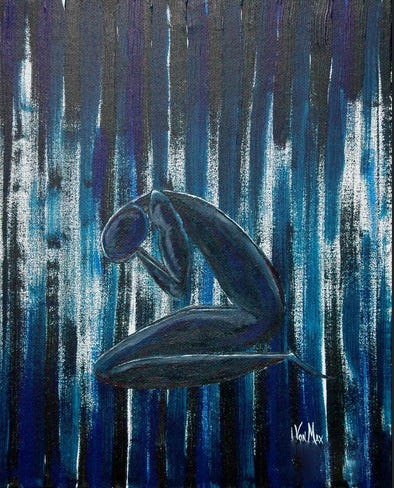Embracing Our Mortality: A Gateway to Greater Freedom & Purpose While Living
Death is not a curse. When seen in the light of recognition, it becomes an amazing gift.
Welcome to this edition of Liminal Walker Musings!
If you are a new subscriber, a special WELCOME! Gratitude to all of you that take a moment to stop by, I am delighted you are here. If you are moved, please leave a comment, I love hearing what is on your mind and in your heart. And if you would like to support my writing with a donation, a cup of chai would be lovely, cheers!
There are always several articles that vie for my attention when I open my web browser. This one caught my eye, Why I Hope to Die at 751, written by Ezekiel J. Emanuel, an oncologist, a bioethicist and author. It inspired this post.
Getting Older
We are all ageing; to not age would defy the natural order of life itself, the cycles that turn, and we along with it. Like our gardens where seeds sprout, mature into plants bearing fruit, then to wither, decay and die. Future seeds resting in the nutrients of this decomposition. How many smaller births and deaths have we experienced in this life alone?
A few years ago, I felt a shift in my ageing process, tipping more toward degeneration than rejuvenation. In a sense, I’m dying, yet still vital and not planning on leaving this world anytime soon. I still get my preventive tests, though I’m not sure how much longer I’ll continue. If medication or treatment were suggested, I’d need a compelling reason, given their unwelcome side effects. Simply prolonging life isn’t enough if it worsens my quality of it. As death approaches, I’d want only palliative care. There is no need to cure this natural process.
My view isn’t a common one, though that is changing. I find what supported me most was meeting death while living. To some, it’s a close encounter with physical death. Or in my case a spiritual one. Opening the door to death brought a freedom I didn’t even know was possible. An invitation to live with more intention and presence. And why I choose not to fight aging. In fact, I’m not only enjoying my Crone years, I’m embracing it.
A few years ago, I had a dream about death, here is the poem (edited) that arose from it.
Death Phobia
We live in a death-phobic culture, one where death is seen as the enemy and war is the means to combat it, with disease and sickness as our battlefields. I am sure you have heard, “they lost their battle with cancer.” Most of our healthcare systems are centered around the idea of avoiding death, even when we’re in the process of dying. An insistence on being in control of life at all costs. But this mindset didn’t start with the medical system. Can you guess where it began?
Lately, I have been using the term CHIP, which stands for Capitalistic Hierarchical Imperialistic Patriarchy. In this context, CHIP represents the systems that govern birth and claim dominion over our planet, all her environments, including our bodies. Women know this one very well. CHIP is also the commandeer of death. How resources and life are harvested and consumed. After all, the Christian God granted dominion over the earth and all its creatures to humanity.
“Our fear of dying is an inherited trauma.
It comes from not knowing how to be at home in the world.
It comes from having no root in the world
and no indebtedness to what has gone before us.”
Stephen Jenkinson
Ezekiel J. Emanuel, said in his article, “Americans seem to be obsessed with exercising, doing mental puzzles, consuming various juice and protein concoctions, sticking to strict diets, and popping vitamins and supplements, all in a valiant effort to cheat death and prolong life as long as possible. This has become so pervasive that it now defines a cultural type: what I call the American immortal. I reject this aspiration. I think this manic desperation to endlessly extend life is misguided and potentially destructive.”2
He goes on to give several reasons why3. (In summary along with some of my comments):
“American immortals” may live longer than their parents, but they are likely to be more incapacitated. There is an assumption that if we extend life into our 80s and 90s, we will also be living healthier lives, along with less time spent in decline. This is not what is being seen.
We have extended life, but only with those that have reached past their 60’s. In the early part of the 20th century, life expectancy increased due to new medicines and better health care. However, since 1960 increases in longevity have been achieved mainly by stretching out old age.
Health care hasn’t slowed the aging process so much as it has slowed the dying process. Using data from the National Health Interview Survey, Eileen Crimmins, a researcher at the University of Southern California, found an “increase in the absolute number of years lost to disability as life expectancy rises.”
There are outliers that do well, but they are rare individuals. Our culture places them on pedestals with the assumption that if they did it, we could do it too! Though by the age of 75, the majority are seeing their energy and productivity in decline, completely gone for some. This is natural, even by design. Look at nature, it is all there.
People wanting to die in the presence of the technological sophistication
that obliges people to live: That is the nightmare.
Stephen Jenkinson
Grief
Grief is another reason many avoid meeting death. It’s a challenging emotion. For me, to be with grief means staying present with it, without judgment or seeking out some feel-good escape or quick fix. Grief is not a problem to be solved.
Sadness is a natural response to what’s occurring. When it comes to dying, grief reflects how deeply we have loved. For the person dying, it’s about letting go of life. For family and friends, it’s about allowing their loved one to move on. This sadness doesn’t require a diagnosis or medication; it’s a normal human response. When sadness is hurried along or denied, is when we see this incessant need to extend life endlessly.
Stephen Jenkinson had this to say about grief… “Grief has to be learned, which means it has to be taught. Which means it’s possible not to learn it. When we keep insisting on grief being a feeling or a process that needs management and closure, we are talking about grief as an affliction, the same way we talk about dying. But something changes when we start seeing grief as a skill that needs learning, which is what it is. As a culture we are grief-impaired not because we don’t have what we need to feel bad, but because we are grief-illiterate. We aren’t taught to grieve; we are taught to handle grief, to resolve grief, to get on the other side of it. We need grief teachers and practitioners, not grief counselors, until the day dawns when they’ve become the same thing.”
Stephen Jenkinson is this amazing soul upon our planet! Thankful for the opportunity to have met him and hear him speak. I have also read his book on dying wise4, not once but twice. He spent years working in palliative care and helping people navigate their grief. He coined the term “the death trade,” where no one wants to die.
Contemplation…
For many, death is so far removed from our everyday living. Old people are put in retirement homes. The killing of animals is packaged as meat for sale. Death is taken out of our homes and into a hospital as a medical event. No wonder there is death anxiety for we live in a culture that hides the inevitable.
Yet death isn’t a medical event, it is a natural and inherent part of the cycle of life. When death enters our world it’s an opportunity for remembrance. To sense into the fragility of life, and how finite time is. An invitation to contemplate one’s own mortality and to see the gifts that it brings, like:
a greater understanding of other’s pains and sorrows.
a means of entering a richer, more purposeful life.
inspiring us to settle unresolved issues.
expressing love more freely.
making choices that reflect our true priorities.
May death bless you journey of life! Bringing you greater freedom and purpose.
I offer both tarot readings and personalized one-on-one sessions. Both designed to support and nurture your inner explorations, helping you gain deeper insight into the movements of your life. If you're interested, feel free to reach out to me via direct message or email. Love and Blessings to you!
For more information about the liminal and my offerings:
Please go to: https://www.liminalwalker.com/
Stay up-to-date and subscribe
All of my writings are available for free. However, by becoming a paid subscriber, you are honoring the time and energy I invest in creating these posts. You may also choose to support me with a donation, as a cup of chai. Thanks for being here!
Emanuel, Ezekiel J. (2014, September 17). Why I Hope to Die at 75, The Atlantic, https://getpocket.com/explore/item/why-i-hope-to-die-at-75
Ibid.
Ibid.
Jenkinson, Stephen. Die Wise: A Manifesto for Sanity and Soul. North Atlantic Books, 2015. Kindle.












So beautiful, Julie! Your poem is breathtaking. And I love how much we continue to be on the same page! I'm literally writing a series on this exact topic (intertwining the ancestors, of course 😁). In one of my first visits with Death, she appeared to me as a sort of cruise director (clip board and all) bringing with her the calm knowing that all would be taken care of for me on "the other side". There was such relief in the idea that I won't need any kind of plan once I'm there. ❤️❤️❤️
You did a fantastic job of calling out CHIP again here, Julie. Our death-denying and ageist culture is the cause of so much suffering. It's so true that we aren't prolonging life, but prolonging the dying process. Both my parents died at 91 in 2021; it was a long, torturous goodbye that involved watching both of them deteriorate and unspool at an excruciatingly slow pace in a facility where there was little quality of life.
This past fall, I took a 6-week writing workshop called "Writing about Death" - probably the best writing workshop I've ever taken (it made me immeasurably happy to write about death...so it's not surprising I love that Dark Goddess deck so much ; ) ). It was such a gift to deep dive with others on the subject. I'm with you - palliative treatment only, please.